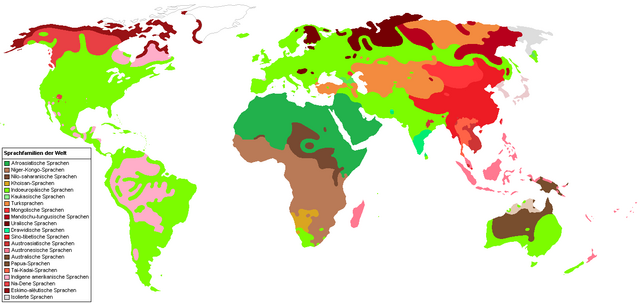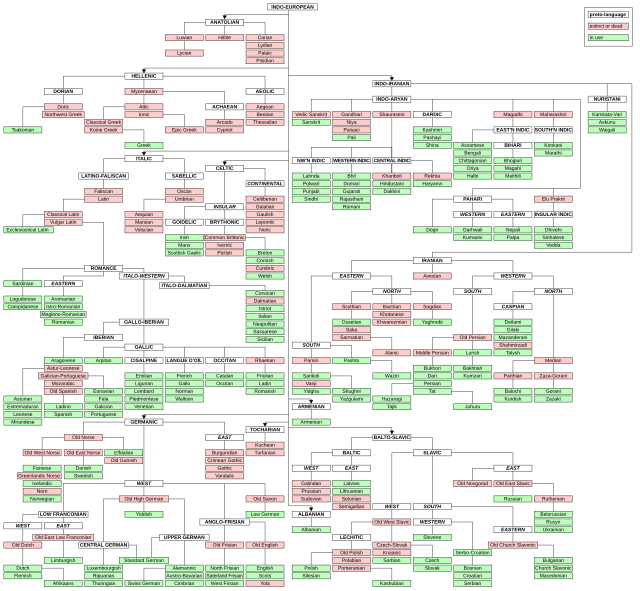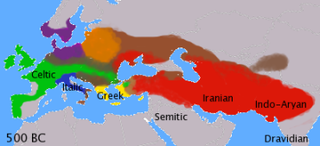De indogermanischn oda indoeiropäischn Sprochn buidn de heit sprechareichste Sprochfamij vo da Wejd mid uma drei Milliardn Muadasprochlan.
| Der Artikl is im Dialekt Obaboarisch gschriem worn. |


Iahre grouße Vabroatung is as Agebnis vo de Väikawondarunga im Laff vo de Joartausad und zletzt aa vo da eiropäischn Expansion seitm 15. Joarhundad. De dozuaghearing Sprochn zoang weitreichade Iwaeihstimmunga beim Woatschotz, in da Flexion, in grammatischn Kategoriina wia Numerus und Genus sowia im Oblaut.
Ois Uasprung vo da Sprochfamij wead a oanzlne, voagschichtliche Indogermanische Uasproch oogsetzt, de wo im Grund duachn Vagleich vop de Oanzlsprochna rekonstruiad wean hod kenna.
Da Nam
Da Nam langues indo-germaniques is vom denischn Geograf Conrad Malte-Brun (1775-1826) eihgfiaht worn[1] und hod se im deitschn Sprochraum geng's international gebraichliche indoeiropäisch duachgsetzt. Im Begriff "indogermanisch" stecka de Sprochgrenzn, de wo domois duach's Indische und duach's Germanische ognumma woan san.
Uasprung und Entwicklung
De indogermanischn Sprochn wean ois genealogisch vawondt betrochdt, d. h., ois „Tochtasprochn“ vo oana „Muadasproch“, des wo des nimma dahoidane Uaindogermanische gwen is.
De Ausbroadung vo de indogermanischn Sprochn
De Koartn zoang de woarscheinliche Ausbroadung und Differenziarung vo de indogermanischn Sprochen bis umara 500 n.Kr. Die Karten zeigen die vermutete geographische Ausbreitung und die Differenzierung der indogermanischen Sprachen bis ca. 500 n. Chr.
Haptastln vom Indogermanischn
Haptastln vo de indogermanischn Sprochn, de wo si bis heit dahoidn ham:
- Albanisch, möglicherweise eine Nachfolgesprache des Illyrischen
- Armenisch
- Boitische Sprochn
- Germanische Sprochn
- Griachisch
- Indoiranische Sprochn
- Indoarische Sprochn
- Iranische Sprochn
- Nuristani-Sprochn
- Italische Sprochn, olle ausgstoam bis af de:
- Kejtische Sprochn Kötische Schprochn
- Slawische Sprochn
A Konjugationsbeispui
Im Foigadn a Beigungsbeispui vo da Verbwuazn *bʰer- vom boarischn Zeidwoat (ge-)bean (im Sinn vo "drong", vgl. im Boarischn "drogad"/"ausdrong") in vaschiedanan oidn und modeanan indogermanischn Sprochn.
| Uaindogermanisch (*bʰer- 'drong, gebean') | |
|---|---|
| I (1. Sg.) | *bʰéroh₂ |
| Du (2. Sg.) | *bʰéresi |
| Ea/Se/Es (3. Sg.) | *bʰéreti |
| Mia (1. Dual) | *bʰérowos |
| Ia (2. Dual) | *bʰéreth₁es |
| Se (3. Dual) | *bʰéretes |
| Mia (1. Pl.) | *bʰéromos |
| Ia (2. Pl.) | *bʰérete |
| Se (3. Pl.) | *bʰéronti |
| Haptgruppm | Hellenisch | Indo-Iranisch | Italisch | Kejtisch | Armenisch | Germanisch | Boito-Slawisch | Oibanisch | ||
|---|---|---|---|---|---|---|---|---|---|---|
| Indo-Arisch | Iranisch | Boitisch | Slawisch | |||||||
| Oide Vadreda | Oidgriachisch | Vedisch Sanskrit | Avestisch | Latein | Oidirisch | Klassisches Armenisch | Gotisch | Oidbreissisch | Oids Kiraslawisch | Oidalbanisch |
| I (1. Sg.) | phérō | bhárāmi | barā | ferō | biru; berim | berem | baíra /bɛra/ | berǫ | *berja | |
| Du (2. Sg.) | phéreis | bhárasi | barahi | fers | biri; berir | beres | baíris | bereši | ||
| Ea/Se/Es (3. Sg.) | phérei | bhárati | baraiti | fert | berid | berē | baíriþ | beretъ | ||
| Mia (1. Dual) | — | bhárāvas | barāvahi | — | — | — | baíros | berevě | ||
| Ia (2. Dual) | phéreton | bhárathas | — | — | — | — | baírats | bereta | ||
| Se (3. Dual) | phéreton | bháratas | baratō | — | — | — | — | berete | ||
| Mia (1. Pl.) | phéromen | bhárāmas | barāmahi | ferimus | bermai | beremk` | baíram | beremъ | ||
| Ia (2. Pl.) | phérete | bháratha | baraϑa | fertis | beirthe | berēk` | baíriþ | berete | ||
| Se (3. Pl.) | phérousi | bháranti | barəṇti | ferunt | berait | beren | baírand | berǫtъ | ||
| Heitige Vadreda | Griachisch | Hindi | Persisch | Franzesisch | Irisch | Armenisch | Boarisch | Litauisch | Tschechisch | Albanisch |
| I (1. Sg.) | férno | (maiṃ) bharūṃ | (man) {mi}baram | (je) {con}fère | beirim | berum em; g'perem | (i) {ge}bea | beriu | beru | (unë) bie |
| Du (2. Sg.) | férnis | (tū) bhare | (tu) {mi}bari | (tu) {con}fères | beirir | berum es; g'peres | (du) {ge}iast | beri | bereš | (ti) bie |
| Ea/Se/Es (3. Sg.) | férni | (vah) bhare | (ān) {mi}barad | (il) {con}fère | beireann; %beiridh | berum ē; g'perē | (ea)(se)(es) {ge}biat | beria | bere | (ai/ajo) bie |
| Mia (1. Dual) | beriava | |||||||||
| Ia (2. Dual) | beriata | |||||||||
| Se (3. Dual) | beria | |||||||||
| Mia (1. Pl.) | férnume | (ham) bhareṃ | (mā) {mi}barim | (nous) {con}férons | beirimid; beiream | berum enk`; g'perenk` | (mia) {ge}bean | beriame | berem(e) | (ne) biem |
| Ia (2. Pl.) | férnete | (tum) bharo | (šomā) {mi}barid | (vous) {con}férez | beireann sibh; %beirthaoi | berum ek`; g'perek` | (ia) {ge}beat | beriate | berete | (ju) bini |
| Se (3. Pl.) | férnun | (ve) bhareṃ | (ānān) {mi}barand | (ils) {con}fèrent | beirid | berum en; g'peren | (se) {ge}bean | beria | berou | (ata/ato) bien |
Beleg
Literatua
Im Netz
Wikiwand in your browser!
Seamless Wikipedia browsing. On steroids.
Every time you click a link to Wikipedia, Wiktionary or Wikiquote in your browser's search results, it will show the modern Wikiwand interface.
Wikiwand extension is a five stars, simple, with minimum permission required to keep your browsing private, safe and transparent.





